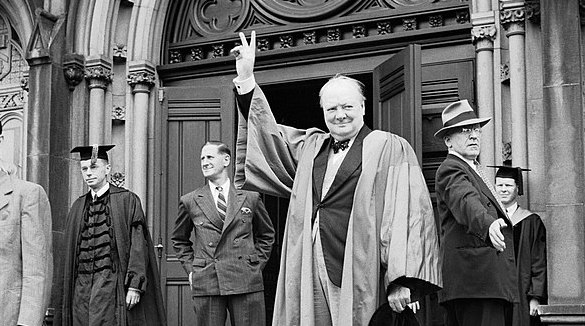
“The Most Important Thing about Education” —Churchill at Bristol
I am asked if Churchill ever said “the most important thing about education is appetite.” He did, but it isn’t easy to find. I checked his Complete Speeches under “education.” Here is the extract, from a 1929 speech at the University of Bristol, where he was Chancellor. He had never had the advantage of a university education, Churchill said:
I was not thought clever enough to profit by it to the full. I was put to be trained in technical matters of a military college… almost immediately afterwards things opened out very quickly into action and adventure [and] I found myself scurrying about the world from one exciting scene to another. During years appropriate to study and the accumulation of knowledge, I was a pack-horse that had to nibble and browse such grass as grew by the roadside in the brief halts of long and wearying marches.
But see how very lucky you all are. You are a most fortunate crowd of quadrupeds, to use a neutral term. (Laughter.) You are admitted to a spacious paddock with the very best herbage growing in profusion. You are pressed to eat your fill. I hope you are going to take advantage of that.
Churchill then added…
The most important thing about education is appetite. Education does not begin with the university, and it certainly ought not to end there. I have seen a lot of people who got cleverer until about 21 or 22 years of age, then seemed to shut down altogether and never made any further progress. Take full advantage of these years when the wisdom of the world is placed at your disposal. But do not spend too much time in buckling on your armour in the tent. The battle is going on in every walk and sphere of life. —Bristol University, 14 December 1929, Complete Speeches V, 4674.
It wasn’t the first time…
Bristol wasn’t the first place where WSC had equated education with eating. One thinks of his autobiography, My Early Life, where he explained how he educated himself during the “long hot Indian afternoon” while stationed with his Regiment at Bangalore:
It was a curious education. First because I approached it with an empty, hungry mind, and with fairly strong jaws; and what I got I bit; secondly because I had no one to tell me: “This is discredited.” “You should read the answer to that by so and so; the two together will give you the gist of the argument.” “There is a much better book on that subject,” and so forth. —My Early Life (London, 1930, 135-36
Which I suppose speaks volumes on the dangers of reading too haphazardly or narrowly. And without comprehension of opposite points of view. This is something quite a lot of people tend to do nowadays.)






